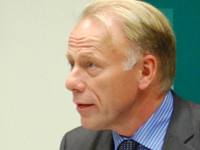Registration
You will receive an email confirming your registration.
IMGXYZ1280IMGZYXOn June 24, 2009, the Carnegie Endowment and the Heinrich Boell Foundation hosted a discussion with Juergen Trittin, former German Federal Minister for the Environment, Nature Conservation and Nuclear Safety. Mr. Trittin, who is a leading candidate of the Green Party in the upcoming German elections, offered his views on nonproliferation, disarmament, and nuclear energy. Carnegie’s Sharon Squassoni moderated the event.
End-Goal: A Nuclear Weapons Convention
Trittin argued that the only guarantee for nuclear nonproliferation is complete nuclear disarmament through a verifiable nuclear weapons convention. Such a convention would ban the manufacture, assembly, testing, use and/or transfer of nuclear weapons. Trittin outlined certain steps to bring the international community closer to a nuclear weapons convention:
- End the rhetoric of nuclear deterrence. Both nuclear weapons states and nuclear “sharing” states (those that have nuclear roles in NATO or rely on extended deterrence) must acknowledge that nuclear deterrence no longer serves security needs.
- Continue and expand arms-reduction negotiations between the U.S. and Russia. China and other nuclear weapon holders must eventually participate.
- Bring the Comprehensive Test Ban Treaty into force. Once the U.S. ratifies the treaty, China will follow soon after.
- Place nuclear reactor fuel production facilities under full international control, especially uranium enrichment and spent fuel reprocessing facilities.
- Conclude a Fissile Material Cutoff Treaty to halt production of fissile material for weapons forever.
Question & Answer
Audience members posed questions about the fate of nuclear energy and its merits compared to other energy resources. Mr. Trittin, a leading figure in Germany’s decision to shut down Germany’s 17 nuclear power plants, declared that the future for nuclear energy is not so optimistic as many observers believe. Nuclear energy, which he called a “niche” market, is in crisis. In Europe, the share of total energy produced by nuclear power is decreasing, as well as the absolute amount of energy produced by nuclear plants. In his view, nuclear power is neither a competitive energy resource, nor an efficient way to reduce greenhouse gases. Renewable technologies are cheaper and more efficient. As a result, Trittin asserted that “nuclear is no longer necessary.”
Germany’s Foreign Minister, Frank-Walter Steinmeier has called for the removal of NATO’s nuclear weapons from German territory. Audience members questioned Germany’s security calculations and the value of nuclear deterrence. Trittin emphasized that Germany does not believe that nuclear deterrence guards against Germany’s most pertinent security challenges—climate change, poverty, terrorism, and proliferation of weapons of mass destruction. Trittin called on other NATO countries to perform honest threat assessments, arguing that NATO’s nuclear umbrella is increasingly irrelevant in a post-Cold War world.
